人教版初中英语知识点总结及练习
人教版七年级下册英语Unit 9知识点归纳总结与练习(含答案))
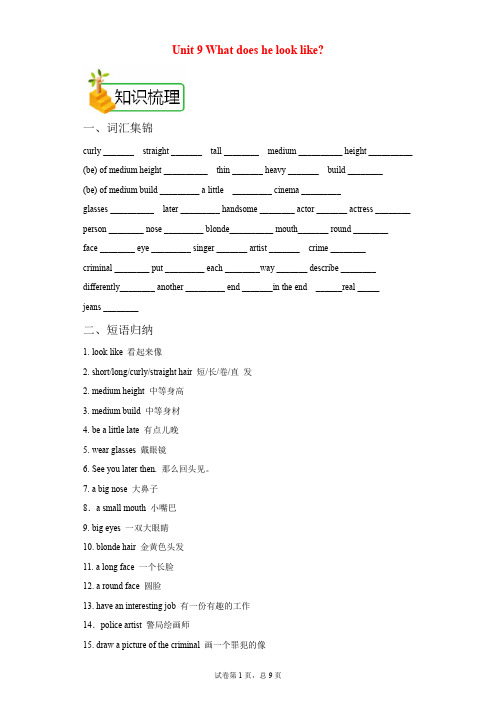
Unit 9 What does he look like?一、词汇集锦curly _______ straight _______ tall ________ medium __________ height __________ (be) of medium height __________ thin _______ heavy _______ build ________ (be) of medium build _________ a little _________ cinema _________glasses __________ later _________ handsome ________ actor _______ actress ________ person ________ nose _________ blonde__________ mouth_______ round ________face ________ eye _________ singer _______ artist _______ crime ________criminal ________ put _________ each ________way _______ describe ________ differently________ another _________ end _______in the end ______real _____jeans ________二、短语归纳1. look like 看起来像2. short/long/curly/straight hair 短/长/卷/直发2. medium height 中等身高3. medium build 中等身材4. be a little late 有点儿晚5. wear glasses 戴眼镜6. See you later then. 那么回头见。
人教版初中英语初一上册Unit4 知识点总结与练习
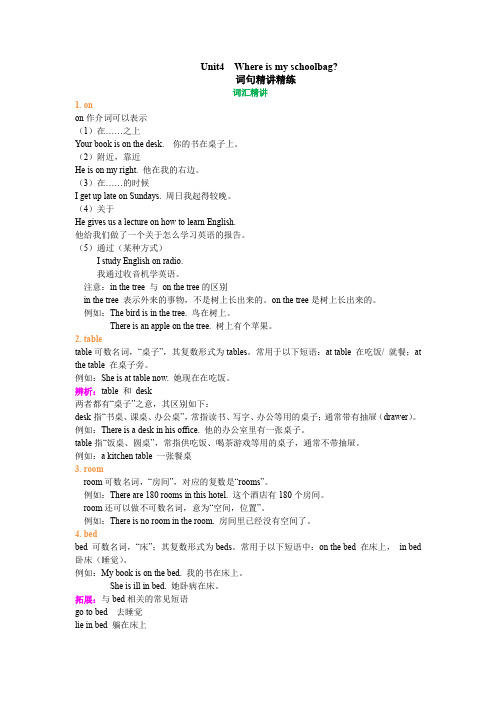
Unit4 Where is my schoolbag?词句精讲精练词汇精讲1. onon作介词可以表示(1)在……之上Your book is on the desk. 你的书在桌子上。
(2)附近,靠近He is on my right. 他在我的右边。
(3)在……的时候I get up late on Sundays. 周日我起得较晚。
(4)关于He gives us a lecture on how to learn English.他给我们做了一个关于怎么学习英语的报告。
(5)通过(某种方式)I study English on radio.我通过收音机学英语。
注意:in the tree 与on the tree的区别in the tree 表示外来的事物,不是树上长出来的。
on the tree是树上长出来的。
例如:The bird is in the tree. 鸟在树上。
There is an apple on the tree. 树上有个苹果。
2. tabletable可数名词,“桌子”,其复数形式为tables。
常用于以下短语:at table 在吃饭/ 就餐;at the table 在桌子旁。
例如:She is at table now. 她现在在吃饭。
辨析:table 和desk两者都有“桌子”之意,其区别如下:desk指“书桌、课桌、办公桌”,常指读书、写字、办公等用的桌子;通常带有抽屉(drawer)。
例如:There is a desk in his office. 他的办公室里有一张桌子。
table指“饭桌、圆桌”,常指供吃饭、喝茶游戏等用的桌子,通常不带抽屉。
例如:a kitchen table 一张餐桌3. roomroom可数名词,“房间”,对应的复数是“rooms”。
例如:There are 180 rooms in this hotel. 这个酒店有180个房间。
初中英语人教版八上Unit1知识点及练习题

初中英语⼈教版⼋上Unit1知识点及练习题教学主题:(⼈教版)8AU1Section B:Where did you go on vacation?教学重难点:1.课⽂讲解;2.基础题练习教学过程:1.导⼊Monday, July 1sthI arrived in Penang in Malaysia this morning with my family. It was sunny and hot, so we decided to go to the beach near our hotel. My sister and I tried paragliding,. I felt like I was a bird. It was so exciting! For lunch, we had something very special-Malaysian yellow noodles. They were delicious! In the afternoon, we rode bicycles to Georgetown. There are a lot of new buildings now, but many of the old buildings are still there. In Weld Quay, a really old place in Georgetown, we saw the houses of the Chinese traders from 100 years ago. I wonder what life was like here in the past. I really enjoyed walking around the townTuesday, July l6thWhat a difference a day makes! My father and I decided to go to Penang Hill today. We wanted to walk up to the top, but then it started raining a little so we decided to take the train. We waited over an hour for the train because there were too many people. When we got to the top, it was raining really hard. We didn’t have an umbrella so we were wet and cold. It was terrible! And because of the bad weather, we couldn’t see anything below. My father didn’t bring enough money, so we only had one bowl of rice and some fish. The food tasted great because I was so hungry!2.呈现1.activity n.活动。
人教版初中英语知识点总结

人教版初中英语知识点总结初中英语是每位学生必修的科目之一,它承载了学生建立起英语基础和提高口语、听力、阅读、写作能力的重要任务。
在初中英语学习过程中,有许多重要的知识点需要掌握。
本文将针对人教版初中英语课程,对其中的知识点进行总结和归纳,以便帮助学生更好地理解和掌握这些内容。
一、语法知识点总结1. 时态:包括一般现在时、一般过去时、一般将来时等。
1) 一般现在时:表示经常性、习惯性的动作或真理等。
例句:I often go to school by bus.2) 一般过去时:表示过去发生的动作或状态。
例句:She watched a movie yesterday.3) 一般将来时:表示将来发生的动作或状态。
例句:We will have a party tomorrow.2. 词性:包括名词、动词、形容词、副词等。
1) 名词:表示人、事、物、地方等具体或抽象的东西。
例句:There is a cat on the tree.2) 动词:表示行为或状态。
例句:She is singing a song.3) 形容词:修饰名词或代词,表示人或事物的特征。
例句:He is a tall boy.4) 副词:修饰动词、形容词、副词等,表示程度、方式、时间等。
例句:She runs very fast.3. 句型:包括陈述句、疑问句、祈使句、感叹句等。
1) 陈述句:陈述一个事实或提供信息。
例句:I like swimming.2) 疑问句:用于提问。
例句:Do you like chocolate?3) 祈使句:表示请求、建议、命令等。
例句:Please close the door.4) 感叹句:用于表示惊讶、喜悦、气愤等感叹的情绪。
例句:What a beautiful flower!二、听力技巧总结初中英语听力考试是学生考试中的重点之一。
为了取得好成绩,学生需要掌握一些听力技巧。
1. 提前预测:在听力录音开始之前,快速读题,提前预测答案的类型和可能的内容。
人教版英语英语一般过去时知识点总结含答案
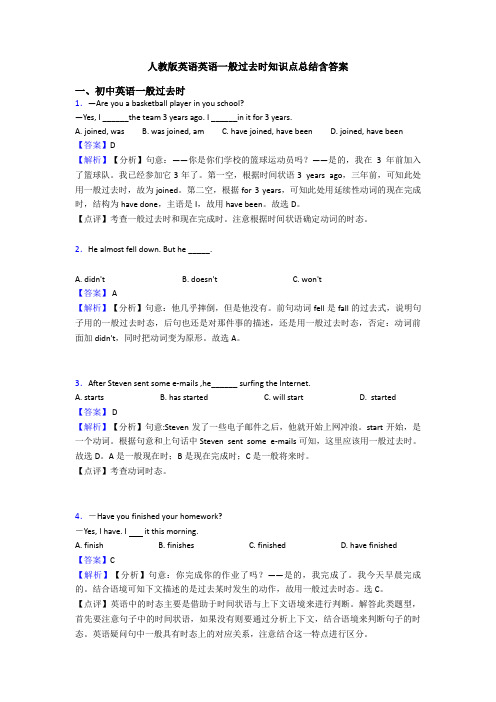
人教版英语英语一般过去时知识点总结含答案一、初中英语一般过去时1.—Are you a basketball player in you school?—Yes, I ______the team 3 years ago. I ______in it for 3 years.A. joined, wasB. was joined, amC. have joined, have beenD. joined, have been 【答案】D【解析】【分析】句意:——你是你们学校的篮球运动员吗?——是的,我在3年前加入了篮球队。
我已经参加它3年了。
第一空,根据时间状语3 years ago,三年前,可知此处用一般过去时,故为joined。
第二空,根据for 3 years,可知此处用延续性动词的现在完成时,结构为have done,主语是I,故用have been。
故选D。
【点评】考查一般过去时和现在完成时。
注意根据时间状语确定动词的时态。
2.He almost fell down. But he _____.A. didn'tB. doesn'tC. won't【答案】 A【解析】【分析】句意:他几乎摔倒,但是他没有。
前句动词fell是fall的过去式,说明句子用的一般过去时态,后句也还是对那件事的描述,还是用一般过去时态,否定:动词前面加didn't,同时把动词变为原形。
故选A。
3.After Steven sent some e-mails ,he______ surfing the Internet.A. startsB. has startedC. will startD. started【答案】 D【解析】【分析】句意:Steven发了一些电子邮件之后,他就开始上网冲浪。
start开始,是一个动词。
根据句意和上句话中Steven sent some e-mails可知,这里应该用一般过去时。
人教版初中英语语法和知识点总结以及练习题81
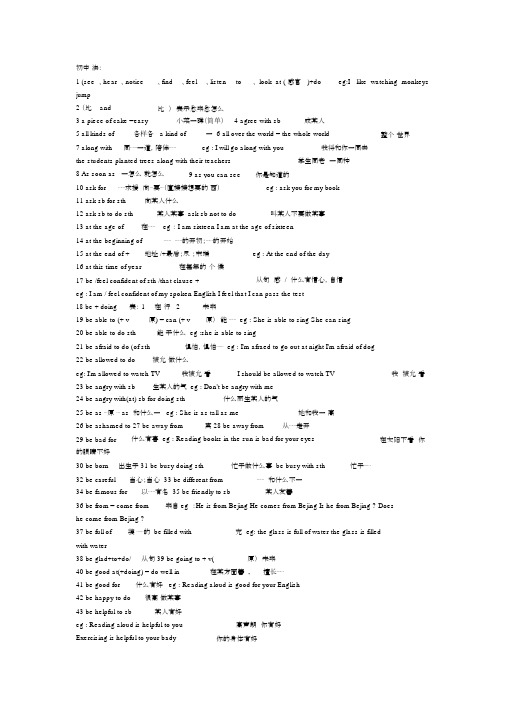
初中法:1 (see 、hear 、notice、find、feel、listen to、 look at( 感官 )+do eg:I like watching monkeys jump2 (比 and比)表示愈来愈怎么3 a piece of cake =easy小菜一碟(简单)4 agree with sb成某人5 all kinds of各样各 a kind of一6 all over the world = the whole world整个世界7 along with同⋯⋯一道,陪伴⋯⋯eg : I will go along with you我将和你一同去the students planted trees along with their teachers学生同老一同种8 As soon as 一怎么就怎么9 as you can see你是知道的10 ask for⋯⋯求援向⋯要⋯(直接接想要的西)eg : ask you for my book11 ask sb for sth向某人什么12 ask sb to do sth某人某事 ask sb not to do叫某人不要做某事13 at the age of在⋯⋯ eg : I am sixteen I am at the age of sixteen14 at the beginning of⋯⋯⋯⋯的开初;⋯⋯的开始15 at the end of +地址 /+最后;尽;末端eg : At the end of the day16 at this time of year在每年的个候17 be /feel confident of sth /that clause +从句感 / 什么有信心,自信eg : I am / feel confident of my spoken English I feel that I can pass the test18 be + doing表: 1在行 2未来19 be able to (+ v原) = can (+ v原)能⋯⋯ eg : She is able to sing She can sing20 be able to do sth能干什么 eg :she is able to sing21 be afraid to do (of sth惧怕,惧怕⋯⋯ eg : I'm afraed to go out at night I'm afraid of dog22 be allowed to do被允做什么eg: I'm allowed to watch TV我被允看I should be allowed to watch TV我被允看23 be angry with sb生某人的气 eg : Don't be angry with me24 be angry with(at) sb for doing sth什么而生某人的气25 be as ⋯原⋯ as 和什么一 eg : She is as tall as me她和我一高26 be ashamed to 27 be away from离 28 be away from从⋯⋯走开29 be bad for什么有害 eg : Reading books in the sun is bad for your eyes在太阳下看你的眼睛不好30 be born出生于 31 be busy doing sth忙于做什么事 be busy with sth忙于⋯⋯32 be careful当心;当心 33 be different from⋯⋯和什么不一34 be famous for以⋯⋯有名 35 be friendly to sb某人友善36 be from = come from来自 eg :He is from Bejing He comes from Bejing Is he from Bejing ? Doeshe come from Bejing ?37 be full of装⋯⋯的 be filled with充 eg: the glass is full of water the glass is filledwith water38 be glad+to+do/从句 39 be going to + v(原)未来40 be good at(+doing) = do well in在某方面善 ,擅长⋯⋯41 be good for什么有好 eg : Reading aloud is good for your English42 be happy to do很高做某事43 be helpful to sb某人有好eg : Reading aloud is helpful to you高声朗你有好Exercising is helpful to your bady你的身体有好44 be in good health身体健康45 be in trouble于困中 eg : She is in trouble They are in trouble46 be interested in某方面感趣47 be late for = come late to到 eg: Be late for class上到48 be like像⋯⋯ eg : I'm like my mother49 be mad at生某人的气50 be made from 由⋯⋯制成 ( 制成此后看不原资料 )51 be made of 由⋯⋯制成 ( 制成此后看得原资料) 52 be not sure表不确立53 be on a visit to参 54 be popular with sb受某人迎55 be quiet寂静 56 be short for表** 的写 eg:陶 is short for陶豪杰57 be sick in bed患病在床 58 be sorry to do sth be sorry for sb eg : I am sorry for you59 be sorry to hear that 60 be sorry to trouble sb eg : I am sorry to trouble you61 be strict in doing sth于做某事 eg : He's strict in obeying noles62 be strict with sb某人要求格 eg: Some students are not strict with them selves些学生自己不格63 be strict with sb in sth某方面某人格 64 be supposed to do被要求干什么65 be sure表确立 66 be sure of doing sth做某事有信心eg: He is sure of winning I am sure of learning English well67 be sure of sth做某事有信心 eg: I'm sure of my head (my teacher我相信我的大(老)68 be sure that sth做某事有信心 eg: I'm suer that he can pass the test我相信他能通考69 be sure to do sth必定会做某事 eg: We are sure to pass the test我必定会通次考We are sure to learn English well我必定能学好英70 be terrified of +名/ doing惧怕⋯⋯ 71 be terrified to do sth惧怕做某事72 be the same as⋯和什么一 73 be used to doing sth做某事eg: My father is used to getting up early我爸爸早 He is used to sleeping in class他上睡74 be worth doing得做什么 75 be(feel) afraid to do sth惧怕做某事 be afraid of sth惧怕某物 be afraid that句76 because+ 句子 because of +短eg : He was late because he had a headache He was late because of his headache77 begin to do = start to do 开始做某事 start ⋯with ⋯ =begin ⋯ with ⋯以什么开始什么 eg : Let's beginthe game with the song I begin to go home78 between ⋯ and⋯二者之79 borrow sth from sb向⋯⋯借⋯⋯lend sth to sb ( lend sb sth借⋯⋯什么西eg : I borrowed a pen from him he lent a pen to me ( he lent me a pen80 both = the same(as) = not different(from)表同样81 bother打bother sb to do stheg : I'm sorry to bother you ,but can you tell me to way to the station我十分致歉打你,可是你能告我怎么去站the problem has been bothering me for weeks个困了我几个周了He's bothering me to lend him money82 by the end of到⋯⋯止83 call sb sth eg : We call him old wang84 care关怀eg : Don't you care about this country's future ?你什么不关怀国家的未来85 catch up with sb追上某人86 chat with sb和某人take sb to +地址某人去某地87 come in88 come over to来89 come up with提出 eg: Can you come up with a good idea你能想出一个好法?90 communicate with sb和某人沟通91 consider + doing考做什么 eg : Why not consider going to lu zhou什么不考去州?92 dance to跟着⋯⋯跳舞 eg : She likes dancing to the music她喜跟着音跳舞93 decide to do sth决定做某事94 do a survey of做某方面的 95 do better in在⋯⋯方面做得更好96 do wrong做 97 Don't forget to do sth不要忘了做某事 98 Don't mind +doing /从句/名不要介怀⋯⋯99 each +名()每一个⋯ eg : Each student has many books 每一个学生都有一些100 end up +doing 101 enjoy +doing喜 102 escape from从⋯⋯逃跑 eg: The prisoners have escaped from the prison罪犯从里逃跑出来103 expect to do sth期望做某事 104 fall down摔下来 fall off从哪摔下来105 fall in love with sb /sth上什么106 far from离某地 eg : The school is far from my home 107 find +it +adj +to do做某事怎么108 find sb/sth +adj什么怎么 eg : I find the book interesting 109 finish达成 +doing (名)110 fit to sb = be fit for sb合适某人 111 forget to do没有做而忘了 forget doing做了而又忘了 eg: Don't forget to go home I forget closing door 112from ⋯to ⋯从某某到某某 eg: From me for her113 get /have sth down做完,被(人)做⋯eg: I have my hair cut我理了 ( 被剪了)Tom got his bad tooth pulled out母把他的坏牙拔掉了(被牙医拔掉了)114 get a part-time job= find a part-time job 115 get along well with sb = get on well with sb与某人相得好116 get along with sb = get on with sb与某人相 117 get ready for = be ready for什么而准eg : I get ready for math I am ready for math 118 get sb in to trouble某人麻 119 get sb todo sth120 get ⋯from ⋯从某获得某物121 give a talk做告 eg: He is give a tall122 give sth to sb give sb sth某人某物123 go fish go swimming 游泳124 go on to do去做下一件事 go on doing做件事 125 go out away from go out of126 go to school上学(用于的) go to the school去学校(不必定是上学)127 good way to好方法128 hate to do没做的事hate doing做的事129 have a party for sb的晚会 130 have a talk听告一131 have been doing在达成行 eg : You have been talking You have been sleeping since132 have been to⋯(地方)⋯⋯去某地方have gone to⋯(地方)去了某地没回来133 have fun +doing玩得高 134 have sth to do有什么事要做eg: I have a lot of homework to do我有好多家庭作要做I have nothing to do我没什么事情做135 have to do sth必做某事136 have trouble (problem) (in) doing sth做什么事情有麻137 have ⋯time +doing138 have ⋯() ⋯off放⋯⋯假 eg: I have month off我一个月得假139 hear sb +do/doing听某人做某事 / 正在做某事140 help a lot很大用141 help sb with sth \one's sth帮助某人某事(某方面)help sb (to) do sth帮助某人做某事142 hope to do sth希望做某事143How about(+doing) = What about(+doing)144 how do you like = what do you think of你什么的见解145 if :能否= wethereg: I don't know if (wether) I should go to the party我不知道我能否去参加晚会He don't know if (wether) we will arrive on time tomorrow morning他不知道我明日清晨能否能准抵达146 if :假如,若是(所有接一般)+条件从句eg: I'll go to LuZhou if it does't rain若是明日不下雨,我就去州If they change the plan they will let me know若是他要改划,他会我知道的I'll go to England ,if I have enough money next year假如我明年由足的,我就要去英国147 in one's opinion = sb think某人148 in some ways在某些方面149 in the end = finally(adv)最后150 in the north of⋯什么在什么的北方(north 北 sowth南 west 西 east)151 in the sun在太阳下152 increase增添eg : They've increased the prece of petrol by 3%他把石油价增添了 3%the population has increased from 12 million ten years ago to 18 million now153 instead of +(名)取代eg: I'd like an apple instead of a pear我想要苹果,而不要梨子I like English instead of math我喜英而不喜数学154 introduce sb to sb介某人某人 introduce oneself自我介155 invite sb to do sth邀某人做某事156It takes sb sometime to do sth做某人花掉某人多少eg : It took me 5 minutes to do my homework It takes me half an hour to cook157It's +adj +for sb to do sth某人来做某事怎么158It's +adj +to do做某事怎么159It's +adj for sb于某人来怎么 It's +adj of sb某人来太怎么160It's +adj(for sb) to do(某人来)做某事怎么 It's +adj of sb to do sth某人来做某事太怎么eg : It's nice of you to help me with my English161It's a good idea for sb to do sth⋯⋯ 来是个好想法162It's important to sb某人来很重要 eg: It's important to me163It's time to do sth It's time for sth到了去做某事的eg : It's time to have class It's time for class去上了164 join = take part in参加165 just now才166 keep +sb /sth +adj /介短什么保持什么?167 keep out不⋯⋯ 入168 keep sb adj⋯⋯保持⋯⋯eg: I want to keep my mother happy keep healthy保持健康169 key to +名表示:某物的匙或某的答案170 key to ⋯ anser to⋯ key 能够是答或匙171 laugh at⋯讥笑⋯⋯ eg : Don't langh at others We langhed at the joke172 learn by oneslfe自学173 learn from sb向某人学 eg: We should learn from Lei Feng174 learn to do sth学做某事175 let sb do sth某人做某事176 Let sb down某人绝望 eg : We shouldn't let our farents down我不我的父亲母亲绝望177 live from :离某地178 live in +大地方 /at +小地方居住在某地 eg: I live in LuZhou She lives at XuanTan179 look after = take care of照照看180 lose one's way迷路 eg : Lose your way你迷路181 make a decision to do sth决定做某事182 make friends with sb和成朋友 eg : I want to make friends with you183 make it early把定的早一点184 make on exhibition of oneself某人出洋相185 make sb /n +n使什么成什么 eg : I made her my step moller I made you my wife186 make sb /sth +adj使某人(某物)怎么 eg : You must made your bed clean187 make sb /sth adj使某人 / 某物怎么188 make sb do sth某人做某事 eg : I made him write我从前他写189 make up be made up of (被)由⋯⋯成190 make⋯difference to⋯191 mind sb to do mind one's doing介怀⋯⋯做什么192 most + 名 most of +代193 much too +形容 194 must be必定 195 need +名196 need sb do sth需要某人做某事197 need to do () need do ( 情)198 no /neithr of hate to do no /neithr of hate doing199 no + 名200 not anymore = no more不再⋯⋯ eg: He didn't cry any more He cried no more他不再哭201 not ⋯ ( 形、副) at all eg: He's not tall at all she doesn't junp far at all202 not ⋯at all一点都不203 not ⋯either表否认,也不 eg : I don't japanse either I don't have sister, either我也没有姐姐204 not ⋯until直到⋯⋯才⋯⋯eg: I didn't sleep until my mother came back The child didn't stop crying until I give her sugar205 offer / provide sb with sth某人供给206 offer sb sth ( offer sth to sb供给什么西某人 eg : I offer you water (I offer water toyou 我你供给水207 on one's way to⋯在去那的路上208 on the one hand一方面 on the other hand另一方面209 on the phone = over the phone用交210 on time准 in time及211 one day=some day=someday 一天,有一天212 one of + 可数名的复数形式213 one to another一个到另一个214 over and over agin一遍又一遍的 eg : He cleaned the floor over and over agin215 part-time job兼工作 fall-time job全工作216 pay for⋯付⋯⋯ pay the bill开,付217 please +do218 please help yourself219 pleased with sb220 pool into = pore into221 practice +doing做某事222 prefer sth to sth相⋯⋯更喜⋯⋯ eg : I prefer physics to chemisty在物理和化学中,我更喜物理prefer doing to sth更喜去做⋯不肯意去做⋯eg: He prefers riding a bike to diving他更喜自行,不开小prefer to do sth rather than do sth情愿做⋯也不肯eg: My unde prefers to buy a now car rather than repaiv the used one我叔叔更喜新的,也不去修旧prefer sb not to do sth更愿意⋯ eg: I prefer her not to come我不喜她不来223 pretend to do sth装着去做什么 pretend that从句eg : The two cheats pretended to be working very hard两个子装着努力工作He pretended that he did not know the answer他装着不知道答案224 rather ⋯ than宁愿⋯⋯也不⋯⋯eg : I would rather be a doctor than a teacher我愿肯当医生,也不妥老He likes dogs rather than cats他喜狗,不喜猫225 regard ⋯ as 把⋯⋯看作⋯⋯eg: Please give my best regards to your family我向你的家人我最好的候I regard you as my friend我把你看作我的朋友He shows little regard for others他不关怀人226 remind sb about sth提示某人什么事 remind sb to do sth提示某人做某事eg : he reminds me about cooking (he reminds me to cook他提示我做227 remind sb of sth使某人想起什么eg : the pictures remind me of my school days照片使我想起了我的学校the words that (which) the teacher talk to remind me of my mother228 return sth to sb什么西某人229 say to oneself自己230 say to sb某人231 sb spend someone on sth花了多少在某事上232 sb spend sometime with sb花了多少陪233 sb spend sometime(in) doing sth花了多少做某事234 sb with sb +is sb and sb +are235 see sb do 看某人做某事see sb doing看某人正在做某事236 seem to do/be +adj得怎么 eg : You seem to be tired You seem to be happy237 send +sb sth送某人某物初一至初三全程英知点及初一年(上)【知梳理】11.What ’ s ⋯ plus ⋯? It’ s⋯ .I.重点短12.I think⋯13.Who ’s this? This is⋯ .1.Sit down14.What can you see? I can see⋯ .2. on duty15.There is (are)⋯.3. in English16.What colour is it (are they)?It ’ s (They ’4. have a seat re)⋯5. at home17.Whose⋯is this? It’s ⋯.6. look like18.What time is it? It’s ⋯.7. look at8. have a look III.交用9. come on10. at work 1.Good morning, Miss/Mr⋯ .11. at school 2.Hello! Hi!12. put on 3.Nice to meet you. Nice to meet you, too.13. look after 4.How are you? I ’m fine, thank you/thanks.14. get up And you?15. go shopping 5.See you. See you later.6.Thank you! You ’re welcome.II.重要句型7.Goodbye! Bye!8.What ’s your name? My name is⋯ .1. help sb. do sth.9.Here you are. This way, please.2.What about ⋯?10.Who ’s on duty today?3.Let ’ s do sth.11.Let ’s do.4.It ’s time to do sth.12.Let me see.5.It ’s time for⋯6.What ’s⋯ ? It is⋯/ It ’s⋯IV.重要法7.Where is ⋯? It’s⋯. 1.be 的用法;8.How old are you? I’m⋯. 2.人称代和物主代的用法;9.What class are you in? 3.名的复数和所有格的用法;I ’ m in ⋯. 4.冠的基本用法;10. Welcome to ⋯ . 5.There be句型的用法。
人教版初中英语初一上册Unit 3知识点总结与练习
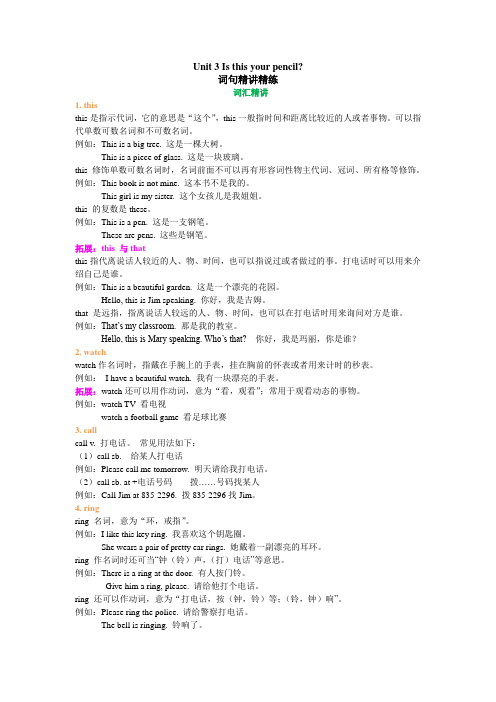
Unit 3 Is this your pencil?词句精讲精练词汇精讲1. thisthis是指示代词,它的意思是“这个”,this一般指时间和距离比较近的人或者事物。
可以指代单数可数名词和不可数名词。
例如:This is a big tree. 这是一棵大树。
This is a piece of glass. 这是一块玻璃。
this 修饰单数可数名词时,名词前面不可以再有形容词性物主代词、冠词、所有格等修饰。
例如:This book is not mine. 这本书不是我的。
This girl is my sister. 这个女孩儿是我姐姐。
this 的复数是these。
例如:This is a pen. 这是一支钢笔。
These are pens. 这些是钢笔。
拓展:this 与thatthis指代离说话人较近的人、物、时间,也可以指说过或者做过的事。
打电话时可以用来介绍自己是谁。
例如:This is a beautiful garden. 这是一个漂亮的花园。
Hello, this is Jim speaking. 你好,我是吉姆。
that 是远指,指离说话人较远的人、物、时间,也可以在打电话时用来询问对方是谁。
例如:That’s my classroom. 那是我的教室。
Hello, this is Mary speaking. Who’s that? 你好,我是玛丽,你是谁?2. watchwatch作名词时,指戴在手腕上的手表,挂在胸前的怀表或者用来计时的秒表。
例如:I have a beautiful watch. 我有一块漂亮的手表。
拓展:watch还可以用作动词,意为“看,观看”;常用于观看动态的事物。
例如:watch TV 看电视watch a football game 看足球比赛3. callcall v. 打电话。
常见用法如下:(1)call sb. 给某人打电话例如:Please call me tomorrow. 明天请给我打电话。
人教版初中英语九年级全一册 Unit7 知识清单+习题

人教版初中英语九年级全一册Unit7 知识清单+习题九年Unit 7 Teenagers should be allowed to choose their own clothes.一、必会单词license n (=licence)证件safety n.安全;安全性smoke v吸烟;冒烟,n.烟part-time adj&adv兼职(的) pierce v扎;刺破;穿透earring n耳环;耳饰flash n闪光灯;闪光v.闪耀;闪光tiny adj极小的;微小的cry v&n哭;叫喊field n.田野;场地hug n&v拥抱;搂抱lift v举起;抬高n电梯;搭便车badly adv严重地;差,非常awful adj很坏的;讨厌的teen n.(13至19岁之间的)青少年regret v&n.感到遗憾;懊悔poem n.诗;韵文community n社区;社团chance n.机会:可能性educate v教育;教导manage v完成(困难的事);应付(困难局面) society n.社会support v&n.支持enter v进来;进去choice n选择;挑选二、常考短语、用法go to the shopping center去购物中心have part-time jobs 做兼职工作be excited about对…感到兴奋by my side在我身边make sure确信talk back回嘴;顶嘴agree with sb.同意某人(的意见、观点等) keep … away from避免接近;远离manage one’s own life应付自己的生活be strict with sb.对某人要求严格achieve one’s dream实现某人的梦想enter university进入大学be serious about认真对待make this choice做出这个选择keep off关闭be worried about为……担心get one’s ears pierced扎耳洞take lots of photos拍许多照片through the field穿过田间give sb. a hug给某人一个拥抱listen to sb.听某人的话learn...from向…学习…make one's own decision自己做决定in most Asian societies在大多数亚洲社会get in the way of挡……的路;妨碍how much多么end up结東care about关心in the end最后be allowed to do sth被允许做某事get sth.done使某事被做what to do做什么spend time with sb与某人共度时光be excited about doing sth.对做某事感到兴奋hurt oneself伤到自己regret doing sth.懊悔做某事take care of oneself照顾自己continue to do sth.继续做某事love doing sth.喜欢做某事have nothing against doing sth.不反对做某事have a chance to do sth.有机会做某事spend more time on sth.在某事上花费更多时间stop doing sth停止做某事should do sth.应该做某事need to do sth.需要做某事give sth. to sb把某物给某人allow sb. to do sth.允许某人做某事start doing sth,开始做某事see sb do sth.看见某人做过某事三、基本句型1.I don't think sixteen-year-olds should be allowed to drive2. They aren't serious enough3. Teenagers should not be allowed to smoke.4. Sixteen-year-olds should be allowed to get their ears pierced5. Only then will I have a chance to achieve my dream6. ---Do you think teenagers should be encouraged to make their own decisions?---No, I don't agree with this. Teenagers are too young to make their own decisions.7.Do you think we must keep teenagers away from the Internet?四、重点语法含有情态动词的被动语态1). Teenagers should be allowed to choose their own clothes.应该允许青少年选择他们自己的衣服。
人教版初中英语知识点总结

人教版初中英语知识点总结人教版初中英语知识点总结一、音标和发音1. 26个字母及其大小写形式2. 元音字母和辅音字母的发音规则3. 重音的位置和读音4. 不同音节的读音规则5. 重读和非重读音节的区别二、基本语法1. 代词的用法和形式变化2. 介词的用法3. 数词的表示方式和用法4. 形容词和副词的用法和比较级、最高级的变化规则5. 名词的单复数形式的变化规则6. 动词的时态、语态和语气的变化规则7. 时态的正确使用(一般现在时、一般过去时、一般将来时)8. 句子的各种句型(陈述句、疑问句、祈使句、感叹句)的构成和用法三、基本词汇和短语1. 常见的动词、名词、形容词和副词及其常用短语2. 基本的交际用语和日常用语3. 季节、天气、颜色、数字、时间、日期、地点等基本词汇四、句型和句子结构1. 主谓结构和主谓宾结构2. 系动词和表语的用法3. 介词短语和宾语从句的使用4. 省略句、倒装句和否定句的构成和用法5. 条件句、比较句和时间状语从句的构成和用法6. 间接引语的转述和直接引语的使用方式五、阅读技巧和写作能力1. 阅读理解的技巧和常见题型(主旨题、细节题、推理题、判断题等)2. 写作技巧和写作步骤(描述事物、写人物、记叙故事等)3. 用适当的词汇和句子表达自己的意见、感受和观点六、口语和听力训练1. 听力技巧和听力对话的主题和内容(自我介绍、购物、问路、订票等)2. 口语对话的常用表达方式和交际技巧(问候、道歉、邀请、感谢等)3. 听力材料和口语练习的录音和回放七、常用语法错误和纠正1. 主谓一致和代词的一致性错误2. 时态和语态的错误3. 介词和冠词的错误使用4. 句子结构和语序的错误5. 拼写和标点符号的错误总结:人教版初中英语教材是一本系统性强、内容全面的英语教材,通过学习这本教材,学生可以掌握基本的英语语法、词汇和句子结构,提高听说读写能力和语言运用能力。
同时,通过阅读和写作的训练,学生可以培养自己的阅读理解能力、写作能力和口语表达能力。
人教版中考英语专项训练过去完成时X知识点总结及经典习题(含答案)

人教版中考英语专项训练过去完成时X知识点总结及经典习题(含答案)一、初中英语过去完成时1.Mr. Wang ______ in this factory for 30 years already.A. worksB. is workingC. has workedD. will work【答案】 C【解析】【分析】句意:王先生在这个工厂工作已经30年了。
根据for 30 years already,可知句子为现在完成时,表示发生于过去的动作一直持续到现在。
C是现在完成时结构,故答案是C。
【点评】考查现在完成时,注意结合时间状语确定句子的时态和句子结构。
2.Before O'Shea hosted the Joy FM program in Beijing, he_______ in Hongkong for ten years.A. worksB. has workedC. had workedD. would work【答案】C【解析】【分析】句意:O'Shea在北京主持Joy FM节目前,他已经在香港工作了10年了。
根据Before O'Shea hosted the Joy FM program in Beijing可知,主持节目这个动作发生在过去,而在香港呆了十年是发生在过去的过去,时态要用过去完成时(had +过去分词),故选C。
【点评】考查动词的时态。
牢记过去完成时的用法。
3.— Jack, would you like to see the new movie?— I'd love to, but I______ it already.A. am seeingB. will seeC. seeD. have seen【答案】 D【解析】【分析】句意:——杰克,你愿意去看这个新电影吗?——当然乐意,但是我已经看过了。
由already可知是完成时,所以用have done。
人教版初中英语-八年级上册-unit6知识点+练习

⼈教版初中英语-⼋年级上册-unit6知识点+练习初中英语题集⼋年级上 Unit6知识点⼀:词汇变形1.play – player2.drive – driver3.cook – cook (厨师)/ cooker (炊具;炉灶)4.science –scientist5.violin-violinist6.piano-pianist7.foreign-- foreigner/doc/41bc2ceb6ad97f192279168884868762cbaebbf7.html cate (v.)-- education (n.)—educational (adj.)9.send—sent—sent10.begin—beginning11.improve(v.)—improvement(n.)12.week(n.)—weekly (adv.)13.discuss(v.)—discussion(n.)14.person(n.)—personal(adj.)15.they—themselves(反⾝代词【典型例题】例题1.1.They enjoyed _________(them) at the party last night.讲透考点:考查反⾝代词。
讲透本题:根据句意,本句要表达玩得开⼼。
故短语enjoy oneself 可以表达,再根据已给的词them,所以答案:themselves.例题2.2.Age is a _______(person)problem in the West. Don’t talk about it.讲透考点:形容词的转化。
讲透本题:根据句意,年龄在西⽅是⼀个私⼈的问题,所以person 要转换为七形容词形式personal.例题3.3.At the _______ (begin) of the book, the writer told us a story.讲透考点:词性的转换讲透本题:根据本单元的短语at the beginning 可知该题答案为beginning.相似题:1.Tom is good at ___________ and he wants to be a ___________ when he grows up.(science)2. Everyone should try ___________ themselves because the ___________ is important for us.(improve)3. Student Times is a ___________newspaper. It comes out on Tuesday each ___________.(week)4. They ___________ to make a soccer team as a their New Year’s resolution at the ___________ of last year.(begin)5. I am going to ___________ with my co-workers about the plan. I really wonder what our ___________ will be like? (discuss)答案:1.science scientist 2. to improve improvement 3. weekly week4.began beginning5. discuss discussion知识点⼆:重点短语及句式句型1.be sure about 对某事有把握2.be able to 能够做.....3.in common 共同4.take up 学着做;开始做5.hardly ever ⼏乎不6.Practice doing sth 练习做某事7.Keep on doing sth 不断做某事8.Promise to do sth 答应去做某事9.have to do with关于;与有关系10.-- What do you want to be when you grow up?-- I want to be an engineer11.-- How are you going to do that?-- I’m going to study math really hard【典型例题】例题1.1. Do you want to a doctor when you're older?A. isB. areC. beD. am讲透考点:want to do/be 想做什么事或想成为…讲透本题:根据句意想成为⼀名医⽣,故答案选C.例题2.2. What are you this evening?A. going toB. going to doingC. going to doD. go to do讲透考点:⼀般将来时be going to do 的表达讲透本题:根据时间状语this evening, 该句要⽤⼀般将来时,再看选项be going to do, 故答案选C.相似题:1. Paul wants an actor because he likes acting.A. to beB. beC. becomeD. becoming2. M y sister art when she grows up because she wants to be anartist.A. studiesB. is going to studyC. studiedD. studying3. your brother a magazine from thelibrary?A. Are; going to borrowB. Is; going to borrowC. Will; borrowsD. Are; going to borrows4. --- next year?--- She is going to learn more about English.A. When is she going to learn more about EnglishB. What does she doC. What's she going to doD. Where is she going to do5. --- ?--- I am going shopping.A. What are you going to doB. When are you goingC. Where are you goingD. Who are you going with6. --- David, why are you so excited?--- My father has made a that he will take me to Tibet next month.A. faceB. promiseC. mistake7. The little girl was unable her name.A. to writeB. to writingC. writeD. writing8. --- I don't think that animals should live in zoos.--- . The animals need freedom.A. I agree with youB. I disagree with youC. I agree to youD. I disagree to you答案: 1. A 2. B 3. B 4. C 5. A 6. B 7. A 8. A知识点三:重点语法1.be going to的⽤法(1)be going to是⼀种固定结构,它后⾯要接动词原形,⽤来表⽰按计划或安排要发⽣的事情,含有be going to结构的句⼦中往往有表⽰将来的时间状语。
人教版初中英语初一上册Unit 6 知识点总结与练习

Unit 6 Do you like bananas?词句精讲精练词汇精讲1. eat&haveeat 与have 都可以表示“吃”的意思,有时两者可互换。
例如:I eat (have) an apple every day. 我每天吃一个苹果。
They are having (eating) their lunch. 他们在吃中饭。
eat 可用作不及物动词,后面不跟宾语。
但是have没有这个用法。
例如:We eat well at noon. 我们午饭吃的很好。
注意:“吃药”习惯说“have(take) medicine”,不说“eat medicine”。
2. well&good两者都可以表示“好”的意思。
well是副词,用于修饰动词。
例如:Tom speaks Chinese well. 汤姆的汉语说得好。
He sings well. 他唱得好。
good是形容词,用作定语或表语。
例如:She is a good doctor. 她是个好医生。
His pronunciation is very good. 他的发音很好。
well作形容词时,指的是健康状况良好。
例如:He is quite well. 他身体好。
I hope you will be well soon. 我希望你很快好起来。
3. no&notno 表示“不”,修饰可数名词单数时no=not a; 修饰可数名词复数或者不可数名词时no=not any。
例如:I have no book.=I don’t have a book.I have no books. = I don’t have any books.There is no water in the cup.=There isn’t any water in the cup.no 常用来做否定回答,与yes相对应,not不可以。
例如:Do you like bananas? No, I don’t. 不可以说Not, I don’t.not 用于否定句,放在助动词或者be动词后面表示否定,no 不可以。
人教版(超详)初中英语知识点归纳汇总

初中英语知识归纳总结(打印版)第一课时名词一、概述1、名词的属性:表示人或事物的名称抽象概念的词叫名词。
2、名词分普通名词和专有名词。
普通名词是表示某一类人或事物,或某种物体或抽象概念的名称。
如:teacher, desks, plates, milk, box等,专有名词表示某一特定的人、事物、地方团体、党派、国家机关、语言、节日等专用的名称。
(运用)如:China, Chinese, Saturday, June, Green, Beijing, Olympic等。
(专有名词的第一个字母要大写)二、可数名词与不可数名词1、可数名词是指表示人或事物,可以用数来计量的名词,有单复数之分。
如:glass-----glasses; book---- books2、不可数名词是指所表示的事物不能用数来计量。
如:paper, rice, water , milk, tea等。
3、有些名词在特定情况下由不可数变为可数名词。
Light travels faster than sound; (light:光线,不可数)The lights are on. (light:灯,可数)4、不可数名词的量的表示不可数名词一般无法用数来计算,前面不能用a或an或数词来表示数量,它的量往往借助于容器来表示。
如:a glass of milk ------ four glasses of milka piece of paper ------two pieces of papera bag of rice ------three bags of rice三、可数名词的复数形式(识记、运用)1、可数名词在应用时有单复数之分,单数变复数有规则变化和不规则变化两种。
规则变化policeman---policemen; man---men; woman---women;tooth---teeth; foot---feet; sheep---sheep; deer---deer;Japanese--- Japanese; Chinese --- Chinese; fish --- fish四、名词所有格(运用)名词的所有格是表示所有关系的形式,它也有构成上的变化。
人教版初中英语知识点总结及练习
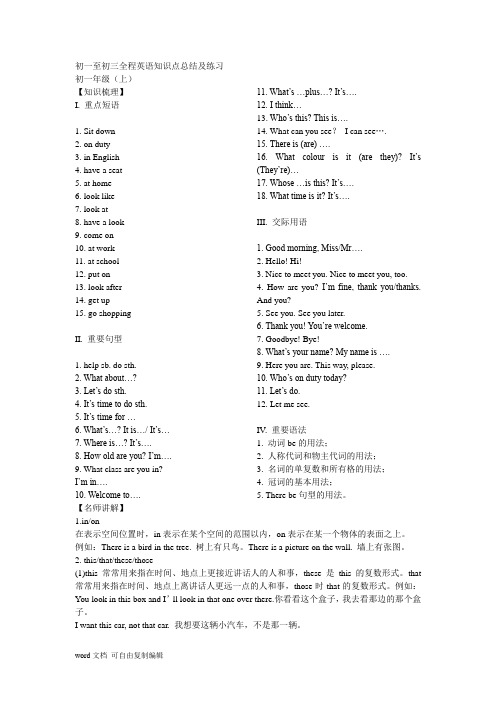
初一至初三全程英语知识点总结及练习初一年级(上)【知识梳理】I. 重点短语1. Sit down2. on duty3. in English4. have a seat5. at home6. look like7. look at8. have a look9. come on10. at work11. at school12. put on13. look after14. get up15. go shoppingII. 重要句型1. help sb. do sth.2. What about…?3. Let’s do sth.4. It’s time to do sth.5. It’s time for …6. What’s…? It is…/ It’s…7. Where is…? It’s….8. How old are you? I’m….9. What class are you in? I’m in….10. Welcome to….11. What’s …plus…? It’s….12. I think…13. Who’s this? This is….14. What can you see?I can see….15. There is (are) ….16. What colour is it (are they)? It’s (They’re)…17. Whose …is this? It’s….18. What time is it? It’s….III. 交际用语1. Good morning, Miss/Mr….2. Hello! Hi!3. Nice to meet you. Nice to meet you, too.4. How are you? I’m fine, thank you/thanks. And you?5. See you. See you later.6. Thank you! You’re welcome.7. Goodbye! Bye!8. What’s your name? My name is ….9. Here you are. This way, please.10. Who’s on duty today?11. Let’s do.12. Let me see.IV. 重要语法1. 动词be的用法;2. 人称代词和物主代词的用法;3. 名词的单复数和所有格的用法;4. 冠词的基本用法;5. There be句型的用法。
人教版初中英语-八年级上册-unit 2知识点+练习

初中英语题集八年级上unit2 How often do you exercise?一.词汇变形单词1.hardly adv.几乎不;简直不;刚刚——hard adj.困难的—— hardness n. 坚硬,硬性2.Internet n.因特网——international adj.国际的—— internationally adv. 国际性的;国际上的3.program n.节目;程序;课程;节目单——programmer n.程序设计者—— programmed v.训练培养4.full adj.满的;充满的;完全的—— fully adv.完全地;充分地—— fuller n. 漂洗工;套锤5.swing n.摇摆;秋千v.摇摆;旋转——swings n. 秋千—— swinging adj. 愉悦的多姿多彩的6.junk n.垃圾;废旧杂物——junky n.吸毒者adj.质量低劣的—— junket n.公费旅游7.health n.健康;人的身体或精神状态—— healthy adj.健康的,健全的—— healthily adv.健康地8.result n.结果;后果—— resulting adj.作为结果的,因而发生的—— resultant n.结果9.percent adj.百分之...的——percentage n.百分比—— percentile n. 百分位10.mind n.头脑;想法;意见;心思—— mindful adj.留心的;注意的——mindless adj. 愚笨的;不小心的11.die v.死;枯竭;消失—— dead adj.死去的完全的—— death n.死亡12.writer n.作者;作家—— writing n. 写作——write v.写13.dentist n.牙科医生—— dentistry n. 牙医学——dental adj.牙齿的牙科的14.teenager n.青少年—— teens n. 十几岁十三到十九的数字——teeny adj. 极小的15.point n.看法;要点;重点;小数点;目标;分数——pointed adj.尖锐的—— pointless adj.无意义的He (几乎不)watches TV.典型例题1.相似题1)She h (几乎不)eats anything.2)In the evening he h (几乎不)exercises.3)We could h (很难)believe our eyes.答案:hardly ever ;hardly ever; hardly ever; hardly2.Our questions were about exercise,use of the (互联网)and watching TV.相似题1)You can find all kinds of information on the (互联网).2)Most of the children like surfing the (互联网).3)(互联网)has changed our life.答案:internet;internet;internet;internet3.What is your favorite (节目)?相似题1)Mary likes the (节目)every much.2)The animal world is always kids’ favorite (节目).3)Tom and john all like the funny (节目).答案:program;program; program;program4.Next week is quiet (满的)for me.相似题1)Her life was too (满的)to find time for hobbies.2)Hotels are often (满的)at this time of the year.3)The bus was (满的)when they got there.答案:full;full;full;full5.Oh, (摇摆)dance,it’s fun.相似题1)(摇摆舞)is a kind of dancing.2)His moods alarmingly.他的心情时好时坏,令人担心.3)You’ve been on the for ten minutes,it’s my go now.你荡秋千有10分钟了,现在该轮到我了。
人教版初中英语初一下册 Unit 8 知识点总结与练习

Unit 8 Is there a post office near here?词汇精讲1. across fromacross from在……的对面;在……对过。
例如:The hospital is across from the supermarket. 医院在超市的对面。
辨析:across与throughacross表示的是从某物的一边到另一边;指从表面上横过。
例如:She ran across the road. 她从马路上跑过。
through表示从内部通过,有“穿过,透过”等意思。
例如:They went through the forest. 他们穿过森林。
2. in front ofin front of是介词短语表示“在......前面”,of的后面经常用名词或者代词表示地点。
例如:My brother sits in front of me in our classroom. 在我们的教室里我弟弟坐在我的前面。
注意:in front of强调一个物体在另一个物体外部的前面。
in the front of强调一个物体在另一个物体内部的前面。
例如:There is a big desk in the front of our classroom. 在我们教室里前面有一个大课桌。
There is a big tree in front of our classroom. 在我们教室前面有一棵大树。
3. free(1)free 形容词,意为“免费的”。
例如:Here is your free lunch. 这是你的免费午餐。
Your ticket is free. 你的票是免费的。
(2)free 作形容词还可以意为“自由的,有空的”。
Are you free tomorrow? 明天你有空吗?I have some free time on weekends. 在周末我有些空闲的时间。
[全]人教版初中英语九年级全一册知识点归纳总结
![[全]人教版初中英语九年级全一册知识点归纳总结](https://img.taocdn.com/s3/m/c5e4e5df25c52cc58ad6be4a.png)
人教版初中英语九年级全一册知识点归纳总结Unit1 How can we become good learners?一、重点短语1. have conversation with sb. 同某人谈话2. too…to…太……而不能3. the secret to………的秘诀4. be afraid of doing sth./ be afraid to do sth. 害怕做某事5. look up 查阅6. repeat out loud 大声跟读7. make mistakes in 在……方面犯错误8. connect ……with…把……和……连接/联系起来9. get bored 感到厌烦10. be stressed out 焦虑不安的11. pay attention to 注意;关注12. depend on 取决于;依靠13. the ability to do sth.. 做某事的能力二、考点详解1. by + doing 通过……方式(by是介词,后面要跟动名词,也就是动词的ing 形式)2. talk about 谈论,议论,讨论The students often talk about movie after class. 学生们常常在课后讨论电影。
talk to sb= talk with sb 与某人说话3. 提建议的句子:①What/ how about +doing sth.? 做…怎么样?(about后面要用动词的ing形式,这一点考试考的比较多)如:What/ How about going shopping?②Why don't you + do sth.? 你为什么不做…?如:Why don't you go shopping?③Why not + do sth. ? 为什么不做…?如:Why not go shopping?④Let's + do sth. 让我们做…...吧。
人教版初中英语八年级上册英语知识点归纳总结复习(单词、短语、句子、语法、练习)
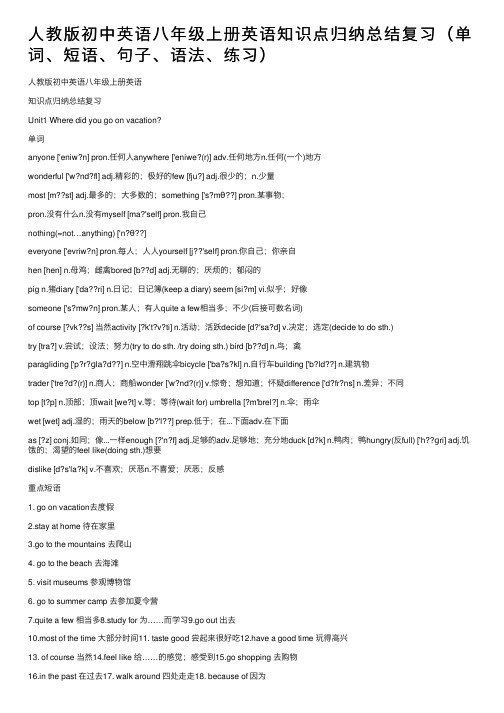
⼈教版初中英语⼋年级上册英语知识点归纳总结复习(单词、短语、句⼦、语法、练习)⼈教版初中英语⼋年级上册英语知识点归纳总结复习Unit1 Where did you go on vacation?单词anyone ['eniw?n] pron.任何⼈anywhere ['eniwe?(r)] adv.任何地⽅n.任何(⼀个)地⽅wonderful ['w?nd?fl] adj.精彩的;极好的few [fju?] adj.很少的;n.少量most [m??st] adj.最多的;⼤多数的;something ['s?mθ??] pron.某事物;pron.没有什么n.没有myself [ma?'self] pron.我⾃⼰nothing(=not…anything) ['n?θ??]everyone ['evriw?n] pron.每⼈;⼈⼈yourself [j??'self] pron.你⾃⼰;你亲⾃hen [hen] n.母鸡;雌禽bored [b??d] adj.⽆聊的;厌烦的;郁闷的pig n.猪diary ['da??ri] n.⽇记;⽇记簿(keep a diary) seem [si?m] vi.似乎;好像someone ['s?mw?n] pron.某⼈;有⼈quite a few相当多;不少(后接可数名词)of course [?vk??s] 当然activity [?k't?v?ti] n.活动;活跃decide [d?'sa?d] v.决定;选定(decide to do sth.)try [tra?] v.尝试;设法;努⼒(try to do sth. /try doing sth.) bird [b??d] n.鸟;禽paragliding ['p?r?ɡla?d??] n.空中滑翔跳伞bicycle ['ba?s?kl] n.⾃⾏车building ['b?ld??] n.建筑物trader ['tre?d?(r)] n.商⼈;商船wonder ['w?nd?(r)] v.惊奇;想知道;怀疑difference ['d?fr?ns] n.差异;不同top [t?p] n.顶部;顶wait [we?t] v.等;等待(wait for) umbrella [?m'brel?] n.伞;⾬伞wet [wet] adj.湿的;⾬天的below [b?'l??] prep.低于;在...下⾯adv.在下⾯as [?z] conj.如同;像...⼀样enough [?'n?f] adj.⾜够的adv.⾜够地;充分地duck [d?k] n.鸭⾁;鸭hungry(反full) ['h??ɡri] adj.饥饿的;渴望的feel like(doing sth.)想要dislike [d?s'la?k] v.不喜欢;厌恶n.不喜爱;厌恶;反感重点短语1. go on vacation去度假2.stay at home 待在家⾥3.go to the mountains 去爬⼭4. go to the beach 去海滩5. visit museums 参观博物馆6. go to summer camp 去参加夏令营7.quite a few 相当多8.study for 为……⽽学习9.go out 出去10.most of the time ⼤部分时间11. taste good 尝起来很好吃12.have a good time 玩得⾼兴13. of course 当然14.feel like 给……的感觉;感受到15.go shopping 去购物16.in the past 在过去17. walk around 四处⾛⾛18. because of 因为⼀碗…… 20. the next day 第⼆天21. drink tea 喝茶19. one bowl of… 22. find out 找出;查明23. go on 继续24.take photos 照相25. something important 重要的事26. up and down 上上下下27. come up 出来28. buy sth. for sb. / buy sb. sth. 为某⼈买某物29. taste + adj. 尝起来…… 动词原形除了……之外什么都没有30. look+adj. 看起来…… 31.nothing…but+32.seem+(to be)+ adj. 看起来…… 33. arrive in+⼤地点/ arrive at+⼩地点到达某地34.decide to do sth. 决定去做某事35. try doing sth. 尝试做某事/ 36. try to do sth. 尽⼒去做某事37. forget doing sth. 忘记做过某事/ 38. forget to do sth. 忘记做某事39. enjoy doing sth. 喜欢做某事40. want to do sth. 想去做某事41. start doing sth. 开始做某事42. stop doing sth. 停⽌做某事43. dislike doing sth.不喜欢做某事44. keep doing sth. 继续做某事45. Why not do. sth.? 为什么不做……呢?46. so+adj.+that+从句如此……以⾄于…… 47. tell sb. (not) to do sth. 告诉某⼈(不要)做某事48 .have a good time=enjoy oneself=have fun(doing sth.)玩得痛快三、重点句⼦:1. Where did you go on vacation? 你去哪⼉度假的?2. Long time no see. 好久不见。
人教版八年级英语上册知识点总结(全)

八年级英语上册知识点总结人教新目标版Unit 1 How often do you exercise一、词汇精讲1、always、usually、often、sometimes、hardly ever和neveralways、usually、often、sometimes、hardly ever和never是英语中最常见的频度副词。
(1)always 的频度为100%,表示动作重复、状态继续,中间没有间断,意思是“总是”、“永远地”。
The sun always rises in the east and sets in the west. 太阳总是东升西落。
(2)usually 的频度为70%左右,意为“通常”、“平常”,即很少有例外。
\He usually goes to bed at ten o’clock. 他通常10点钟睡觉。
(3)often 的频度为50%左右,意为“常常”,但不如usually那么频繁,表示动作重复,中间有间断。
He is often late for school. 他上学经常迟到。
(4)sometimes 的频度为20%左右,意为“有时”,表示动作偶尔发生。
可以位于句首,以示强调。
多用于一般现在时。
It is sometimes hot and sometimes cold. 天气忽冷忽热。
Sometimes he does it this way and sometimes he does it that way.他有时这样做,有时那样做。
(5)hardly ever 的频度为5%左右,意为“几乎不”、“偶尔”,表频率,位置是“行前be 后”。
!I hardly ever go out these days. 这些天我几乎不出门。
(6)never 的频度为0,意为“从来不”、“永不”。
My parents are never late for work. 我父母上班从来不迟到。
- 1、下载文档前请自行甄别文档内容的完整性,平台不提供额外的编辑、内容补充、找答案等附加服务。
- 2、"仅部分预览"的文档,不可在线预览部分如存在完整性等问题,可反馈申请退款(可完整预览的文档不适用该条件!)。
- 3、如文档侵犯您的权益,请联系客服反馈,我们会尽快为您处理(人工客服工作时间:9:00-18:30)。
学习必备欢迎下载初一至初三全程英语知识点总结及练习初一年级(上)【知识梳理】I. 重点短语1. Sit down2. on duty3. in English4. have a seat5. at home6. look like7. look at8. have a look9. come on10. at work11. at school12. put on13. look after14. get up15. go shoppingII. 重要句型1. help sb. do sth.2. What about…?3. Let’s do sth.4. It’s time to do sth.5. It’s time for …6. What’s…? It is…/ It’s…7. Where is…? It’s….8. How old are you? I’m….9. What class are you in? I’m in….10. Welcome to….11. What’s …plus…? It’s….12. I think…13. Who’s this? This is….14. What can you see?I can see….15. There is (are) ….16. What colour is it (are they)? It’s (They’re)…17. Whose …is this? It’s….18. What time is it? It’s….III. 交际用语1. Good morning, Miss/Mr….2. Hello! Hi!3. Nice to meet you. Nice to meet you, too.4. How are you? I’m fine, thank you/thanks. And you?5. See you. See you later.6. Thank you! You’re welcome.7. Goodbye! Bye!8. What’s your name? My name is ….9. Here you are. This way, please.10. Who’s on duty today?11. Le t’s do.12. Let me see.IV. 重要语法1. 动词be的用法;2. 人称代词和物主代词的用法;3. 名词的单复数和所有格的用法;4. 冠词的基本用法;5. There be句型的用法。
【名师讲解】1.in/on在表示空间位置时,in表示在某个空间的范围以内,on表示在某一个物体的表面之上。
例如:There is a bird in the tree. 树上有只鸟。
There is a picture on the wall. 墙上有张图。
2. this/that/these/those(1)this常常用来指在时间、地点上更接近讲话人的人和事,these是this的复数形式。
that 常常用来指在时间、地点上离讲话人更远一点的人和事,those时that的复数形式。
例如:You look in this box and I’ll look in that one over there.你看看这个盒子,我去看那边的那个盒子。
I want this car, not that car. 我想要这辆小汽车,不是那一辆。
Take these books to his room, please. 请把这些书拿到他房间去。
This is mine; that’s yours. 这个是我的,那个是你的。
These are apples; those are oranges. 这些是苹果,那些是橘子。
(2)在打电话的用语中,this常常指的是我,that常常指的是对方。
例如:This is Mary speaking. Who’s that? 我是玛丽。
你是谁?3. There be/ haveThere be "有",其确切含意为"某处或某时存在某人或某物。
"其结构是:There be + 某人或某物+ 表示地点或时间的状语。
There be 后面的名词实际上是主语,be 动词的形式要和主语在数上保持一致,be动词后面的名词是单数或不可数名词时用is,名词是复数时用are。
例如:(1) There is a big bottle of coke on the table. 桌上有一大瓶子可乐。
(2) There is a doll in the box. 那个盒子里有个娃娃。
(3) There are many apples on the tree. 那树上有许多苹果。
总之,There be结构强调的是一种客观存在的"有"。
have表示"拥有,占有,具有",即:某人有某物(sb. have / has sth.)。
主语一般是名词或代词,与主语是所属关系。
例如:(4) I have two brothers and one sister.我有两个兄弟,一个姐姐。
(5) That house has four rooms.那所房子有四个房间。
4. look/ see/ watch(1)look 表示“看、瞧”,着重指认真看,强调看的动作,表示有意识地注意看,但不一定看到,以提醒对方注意。
,如:Look! The children are playing computer games. 瞧!孩子们在玩电脑游戏。
Look! What’s that over there? 看!那边那个是什么?单独使用是不及物动词,如强调看某人/物,其后接介词at,才能带宾语,如:He’s looking at me。
他正在看着我。
(2)see强调“看”的结果,着重的是look这个动作的结果,意思是“看到”,see是及物动词,后面能直接跟宾语。
如:What can you see in the picture? 你能在图上看到什么?Look at the blackboard. What did you see on it?看黑板!你看到了什么?(3)watch“观看,注视”,侧重于场面,表示全神贯注地观看、观察或注视某事务的活动,强调过程,常用于“看电视、看足球、看演出”等。
如:Yesterday we watched a football match on TV.昨天我们从电视上看了一场足球比赛。
4. put on/ / input on意为“穿上,戴上”。
主要指“穿上”这一动作, 后面接表示服装、鞋帽的名词。
in 是介词,表示“穿着”强调状态。
在句中可以做定语、标语和状语。
如:It’s cold outside, put on your coat. 外面冷,穿上你的外衣。
He puts on his hat and goes out. 他戴上帽子,走了出去。
The woman in a white blouse is John’s mother.穿白色衬衣的那个妇女是John的妈妈。
5. house/ home/familyhouse :“房子”,指居住的建筑物; Home: “家”,指一个人同家人共同经常居住的地方; Family: “家庭“,“家庭成员”。
例如:Please come to my house this afternoon. 今天下午请到我家来。
He is not at home. 他不在家。
My family all get up early. 我们全家都起得很早。
6. fine, nice, good, well四者都可用作形容词表示"好"之意,但前三者既可作表语又可作定语,而后者仅用作表语。
主要区别在于:(1) fine指物时表示的是质量上的"精细",形容人时表示的是"身体健康",也可以用来指"天气晴朗"。
例如:Your parents are very fine. 你父母身体很健康。
That's a fine machine.那是一台很好的机器It's a fine day for a walk today.今天是散步的好时候。
(2)nice主要侧重于人或物的外表,有"美好","漂亮"的意思,也可用于问候或赞扬别人。
例如:Lucy looks nice. 露西看上去很漂亮。
These coats are very nice. 那些裙子很好看。
Nice to meet you. 见到你很高兴。
It's very nice of you. 你真好。
(3)good形容人时指"品德好",形容物时指"质量好",是表示人或物各方面都好的普通用语。
例如:Her son is a good student. 她儿子是一个好学生。
The red car is very good. 那辆红色小汽车很好。
(4)well只可用来形容人的"身体好",但不能作定语,它也能用作副词作状语,多放在所修饰的动词之后。
例如:I'm very well, thanks. 我身体很好,谢谢。
My friends sing well. 我的朋友们歌唱得好。
【考点扫描】中考考点在本单元主要集中在:1. 动词be的用法;2. 人称代词和物主代词的用法;3. 名词的单复数和所有格的用法;4. 冠词的基本用法;5. There be句型的用法。
6. 本单元学过的词汇、短语和句型;7. 本单元学过的日常交际用语。
考试形式可以是单项填空、完型填空、短文填空、完成句子。
初一年级(下)【知识梳理】I. 重点短语1. a bottle of2. a little3. a lot (of)4. all day5. be from6. be over7. come back8. come from9. do one’s homework10. do the shopping11. get down12. get home13. get to14. get up15. go shopping16. have a drink of 17. have a look18. have breakfast19. have lunch20. have supper21. listen to22. not…at all23. put…away24. take off25. throw it like that26. would like27. in the middle of the day28. in the morning / afternoon/ evening29. on a farm30. in a factoryII. 重要句型1. Let sb. do sth.2. Could sb. do sth.?3. would like sth.4. would like to do sth.5. What about something to eat?6. How do you spell …?7. May I borrow…?III. 交际用语1. —Thanks very much!—You're welcome.2. Put it/them away.3. What's wrong?4. I think so. I don't think so.5. I want to take some books to the classroom.6. Give me a bottle of orange juice, please. Please give it / them back tomorrow. OK.9. What's your favourite sport?10. Don't worry.11.I’m (not) good at basketball.12. Do you want a go?13. That's right./ That‘s all right./ All right.14. Do you have a dictionary / any dictionaries?Yes, I do. / No, I don’t.15. We / They have some CDs.We / They don’t have any CDs.16. ---What day is it today / tomorrow? ---It’s Monday.17. ---May I borrow your colour pens, please? ---Certainly. Here you are.18. ---Where are you from?---From Beijing.19. What's your telephone number in New York?20. ---Do you like hot dogs?---Yes, I do. ( A little. / A lot. / Very much.)---No, I don't. ( I don't like them at all.)21. ---What does your mother like?---She likes dumplings and vegetables very much.22. ---When do you go to school every day? ---I go to school at 7:00 every day.23. ---What time does he go to bed in the evening?---He goes to bed at 10:00.IV. 重要语法1.人称代词的用法;2. 祈使句;3. 现在进行时的构成和用法;4.动词have的用法;5.一般现在时构成和用法;6.可数名词和不可数名词的构成和用法【名师讲解】1. That's right./ That‘s all right./ All right.That’s right意为“对的”,表示赞同对方的意见、看法或行为,肯定对方的答案或判断。
